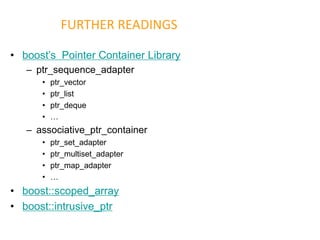C++11 smart pointer
- 2. ? Overview ? shared_ptr ? unique_ptr ? weak_ptr ¨C Cyclic reference problem ¨C Enable shared from this ? Miscs AGENDA
- 3. ? std::shared_ptr ¨C shared ownership ? std::unique_ptr ¨C unique ownership ? std::weak_ptr ¨C No ownership ? NO std::intrusive_ptr OVERVIEW ? boost::shared_ptr ¨C shared ownership ? boost::scoped_ptr ¨C unique ownership ? boost::weak_ptr ¨C No ownership ˇÖ Differences: ? Compiler (C++11 vs C++03) ? Move-Semantic ? std::unique_ptr supports transfer-of-ownership ? boost::scoped_ptr is neither copyable nor movable ? Array support (See details in Miscs)
- 5. ? Features ¨C share ownership ¨C reference count ¨C auto delete ¨C native inheritance ¨C cast ? Overhead ¨C Manager-Object* ¨C Managed-Object-T* ¨C Lock of increment/decrement of reference count (Thread safe) SHARED_PTR shared_ptr<T> Manager Object* T* Reference Counted with Lock Object T
- 6. ? Refer to objects allocated with new and can be deleted with delete ? Create by new or make_shared ¨C shared_ptr<T> t(new T(ˇ)); ¨C shared_ptr<T> t(make_shared<T>(ˇ)); ? Try hard to avoid using raw pointers ¨C Mixing smart and built-in pointers can be hard to get right ? Then never explicitly call delete RULES OF SHARED_PTR
- 7. ? shared_ptr<T> t(new T(ˇ)); ¨C Two dynamic allocations ? shared_ptr<T> t(make_shared<T>(ˇ)); ¨C Single dynamic allocation ? Why? ¨C Manager-Object* ¨C Managed-Object-T* ? Prefer ::make_shared if a lof of shared_ptrs are created MAKE_SHARED VS NEW shared_ptr<T> Manager Object* T* Reference Counted with Lock Object T
- 8. ? http://ideone.com/aEFxlk BASIC USE OF SHARED_PTR std::shared_ptr<TClass> c2(new TClass(2)); // TClass 2 std::shared_ptr<TClass> c3 = std::make_shared<TClass>(3); std::shared_ptr<TClass> c4; // Empty shared_ptr c4.reset(new TClass(4)); // TClass: 4 if (c4) { ... // Do something } c4.reset(); // c4 becomes empty if (c4) { // Now it returns false ... // Code does not go here }
- 9. ? Same as raw pointer ? http://ideone.com/jp4iCI INHERITANCE OF SHARED_PTR std::shared_ptr<TDerived> dp1(new TDerived); std::shared_ptr<TBase> bp1 = dp1; std::shared_ptr<TBase> bp2(dp1); std::shared_ptr<TBase> bp3(new TDerived);
- 10. ? Similar with raw pointer ¨C static_pointer_cast ¨C dynamic_pointer_cast ¨C const_pointer_cast ? Create a new shared_ptr! ? http://ideone.com/TdcPDl CASTING SHARED_PTR std::shared_ptr<TBase> bp1(new TDerived); std::shared_ptr<const TBase> cbp(new TBase); std::shared_ptr<TDerived> dp1 = std::static_pointer_cast<TDerived>(bp1); std::shared_ptr<TDerived> dp2 = std::dynamic_pointer_cast<TDerived>(bp1); std::shared_ptr<TBase> bp2 = std::const_pointer_cast<TBase>(cbp); //std::shared_ptr<TDerived> d = static_cast<std::shared_ptr<TDerived>>(bp1); // Compile error
- 11. std::unique_ptr
- 12. ? Features ¨C Unique ownership ? Copy constructor and copy assignment = delete ¨C No reference count ¨C auto delete ¨C native inheritance ¨C No cast, or manually cast ? Overhead ¨C Nothing! ? Rules? ¨C The same as shared_ptr UNIQUE_PTR
- 13. ? new or std::move (transfer ownership) ? http://ideone.com/bxsFvC BASIC USE OF UNIQUE_PTR std::unique_ptr<TClass> c2(new TClass(2)); std::unique_ptr<TClass> c3; // Empty unique_ptr //c3 = c2; // error: use of deleted function operator=() c3 = std::move(c2); // unique_ptr has to be moved // Now c2 owns nothing // Note that return value of a function is a rvalue std::unique_ptr<TClass> GetATClass() { std::unique_ptr<TClass> c(new TClass(0)); return c; // same as `return std::move(c);` } c3 = GetATClass();
- 14. ? Same as raw pointer ? http://ideone.com/FhgRi9 INHERITANCE OF UNIQUE_PTR std::unique_ptr<TDerived> dp1(new TDerived); std::unique_ptr<TBase> bp1 = std::move(dp1); std::unique_ptr<TBase> bp2(std::move(bp1)); std::unique_ptr<TBase> bp3(new TDerived);
- 15. ? Generally, do NOT cast ? Why no native cast? ¨C Cast makes a copy of the pointer ? But I do want to cast unique_ptr? ? http://ideone.com/F8CfIG CAST(MANUALLY) OF UNIQUE_PTR std::unique_ptr<TBase> bp1(new TDerived); std::unique_ptr<TDerived> dp1(static_cast<TDerived*>(bp1.get())); bp1.release(); // Now bp1 owns nothing bp1 = std::move(dp1); // Transfer ownership to bp1 (inheritance) std::unique_ptr<TDerived> dp2(dynamic_cast<TDerived*>(bp1.get())); bp1.release(); // Now bp1 owns nothing
- 16. std::weak_ptr
- 17. ? ˇ°Observeˇ± the managed object ? Provide a shared_ptr when used ? Why? ¨C Solve cyclic reference of shared_ptr ¨C Helps to get a shared_ptr from ˇ°thisˇ± WEAK_PTR
- 18. ? http://ideone.com/tZ3ZhJ BASIC USE OF WEAK_PTR std::weak_ptr<TClass> w; // Empty weak_ptr { std::shared_ptr<TClass> c(new TClass); // TClass: -1 std::weak_ptr<TClass> w1(c); // Construct from shared_ptr std::weak_ptr<TClass> w; // Empty weak_ptr w = c; std::weak_ptr<TClass> w3(w); w3.reset(); // w3 becomes empty w3 = w; // w3 points to the TClass as well std::shared_ptr<TClass> c2 = w.lock(); //Get shared_ptr by weak_ptr c2->IntValue = 1; } // ~TClass: 1 std::shared_ptr<TClass> c3 = w.lock(); // c3 is empty shared_ptr
- 19. ? http://ideone.com/KP8oSL CYCLIC REFERENCE PROBLEM class CyclicA { public: shared_ptr<CyclicB> b; }; class CyclicB { public: shared_ptr<CyclicA> a; }; void TestSharedPtrCyclicRef() { shared_ptr<CyclicA> a(new CyclicA); shared_ptr<CyclicB> b(new CyclicB); a->b = b; b->a = a; } // Neither a nor b is deleted
- 20. ? http://ideone.com/KP8oSL CYCLIC REFERENCE - FIX class FixCyclicA { public: std::shared_ptr<FixCyclicB> b; }; class FixCyclicB { public: std::weak_ptr<FixCyclicA> a; }; void TestWeakPtrFixCyclicRef() { std::shared_ptr<FixCyclicA> a(new FixCyclicA); std::shared_ptr<FixCyclicB> b(new FixCyclicB); a->b = b; b->a = a; } // Both a and b are deleted
- 21. ? How to get shared_ptr from classˇŻs member function? ENABLE SHARED FROM THIS - WHY class TShareClass { ... std::shared_ptr<TShareClass> GetThis() { // how to achieve? } void CallFoo() { Foo(GetThis()); } } void Foo(const std::shared_ptr<TShareClass>& s) { // Do something to s, e.g. s->xxx = xxx }
- 22. ? A wrong way ENABLE SHARED FROM THIS ¨C THE WRONG WAY class TShareClass { ... std::shared_ptr<TShareClass> GetThis () { return std::shared_ptr<TShareClass>(this); } // This gets deleted after out-of-scope } { std::shared_ptr<TShareClass> a(new TShareClass); std::shared_ptr<TShareClass> temp = a.GetThis(); } // Deleted twice!
- 23. ? One way to achieve: Add a weak_ptr ENABLE SHARED FROM THIS ¨C AN ATTEMP class TMyShareClass { public: std::shared_ptr<TMyShareClass> GetThis() { return MyWeakPtr.lock(); // Make sure MyWeakPtr is valid } std::weak_ptr<TMyShareClass> MyWeakPtr; }; std::shared_ptr<TMyShareClass> c1(new TMyShareClass()); c1->MyWeakPtr = c1; std::shared_ptr<TMyShareClass> c2 = c1->GetThis();
- 24. ? C++11ˇŻs built-in enable_shared_from_this ? http://ideone.com/wRUj3U ENABLE SHARED FROM THIS ¨C A DECENT WAY class TShareClass : public std::enable_shared_from_this<TShareClass> { ... std::shared_ptr<TShareClass> GetThis() { return shared_from_this(); } }; std::shared_ptr<TShareClass> c1(new TShareClass()); std::shared_ptr<TShareClass> c2 = c1->GetThis();
- 25. ? Do not call shared_from_this()from constructor ¨C weak_ptr is not valid yet in ctor ? Always create shared_ptr<T>, never create raw T* ? Consider make ctor/copy-ctors private and unique the creation ¨C Prevent creating raw T in case of wrong usage ¨C Benefit from perfect forwarding ENABLE SHARED FROM THIS ¨C BE CAREFUL TShareClass* c1 = new TShareClass(); std::shared_ptr<TShareClass> c2 = c1->GetThis(); // Undefined behavior // Throws exception 'std::bad_weak_ptrˇ® on gcc 4.9.x
- 26. ? Perfect creation of T (http://ideone.com/UyIPgb) class TPerfectCtor : public std::enable_shared_from_this<TPerfectCtor> { private: TPerfectCtor(int I = -1) = default; TPerfectCtor(const TPerfectCtor& r) = default; public: template<typename ... T> static std::shared_ptr<TPerfectCtor> Create(T&& ... all) { return std::shared_ptr<TPerfectCtor>( new TPerfectCtor(std::forward<T>(all)...)); } std::shared_ptr<TPerfectCtor> GetThis() { return shared_from_this(); } }; // std::shared_ptr<TPerfectCtor> c1(new TPerfectCtor()); // compile error std::shared_ptr<TPerfectCtor> c1 = TPerfectCtor::Create(); // TPerfectCtor: -1 std::shared_ptr<TPerfectCtor> c2 = TPerfectCtor::Create(2); // TPerfectCtor: 2 c2 = c1->GetThis(); // ~TPerfectCtor: 2 ENABLE SHARED FROM THIS ¨C BEST PRACTICE
- 27. Miscs
- 28. ? Default, use unique_ptr ? Default, use unique_ptr in containers ¨C std::vector<std::unique_ptr<T>> ? If the object has shared ownership, use shared_ptr ? If the objects have shared ownership, use shared_ptr in containers ¨C std::vector<std::shared_ptr<T>> ? Prefer to pass by const reference ¨C void Foo(const std::shared_ptr<T>& sp); ¨C void Foo(const std::unique_ptr<T>& up); Do not write like below ¨C void Foo(std::shared_ptr<T>& sp); // Sometimes compile error ¨C Why? sp.reset(new Base) while sp is Derived MISCS
- 29. MISCS ¨C ARRAY SUPPORT std::unique_ptr<T[]> ua(new T [5]); // OK boost::scoped_ptr<T[]> ua(new T [5]); // Compile error std::shared_ptr<T[]> ua(new T [5]); // Compile error boost::shared_ptr<T []> a(new T [5]); // OK (since Boost 1.53) // A custom deleter for array std::shared_ptr<T> a(new T [5], std::default_delete<T[]>()); // OK, but access with a.get()[index] // Never pass T[] to shared_ptr<T> std::shared_ptr<T> a(new T [5]); // Crash boost::shared_ptr<T> a(new T [5]); // Crash
- 30. ? Suggested ways to use array in smart pointer ¨C std::unique_ptr<T[]> ¨C std::shared_ptr<T> with custom delete ¨C boost::shared_ptr<T[]> (Since Boost 1.53) ¨C boost::shared_array<T> ? Consider boost::ptr_vector<T> for vector of shared_ptr if performance is critical ? http://ideone.com/n9lZJ2 MISCS ¨C CONT.
- 31. ? boostˇŻs Pointer Container Library ¨C ptr_sequence_adapter ? ptr_vector ? ptr_list ? ptr_deque ? ˇ ¨C associative_ptr_container ? ptr_set_adapter ? ptr_multiset_adapter ? ptr_map_adapter ? ˇ ? boost::scoped_array ? boost::intrusive_ptr FURTHER READINGS
- 32. Thank You!


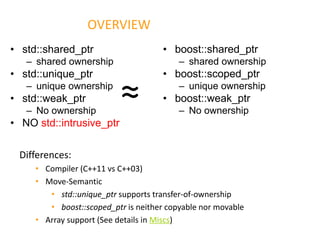


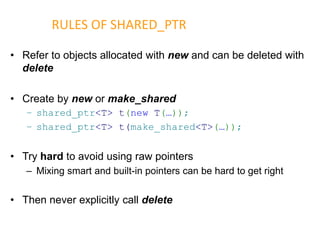



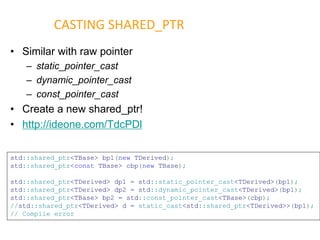




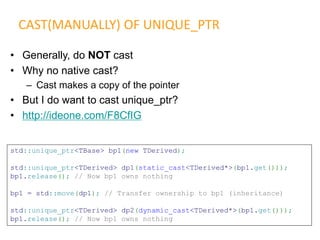








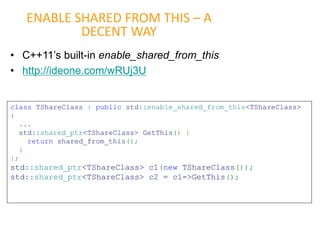




![MISCS ¨C ARRAY SUPPORT
std::unique_ptr<T[]> ua(new T [5]); // OK
boost::scoped_ptr<T[]> ua(new T [5]); // Compile error
std::shared_ptr<T[]> ua(new T [5]); // Compile error
boost::shared_ptr<T []> a(new T [5]); // OK (since Boost 1.53)
// A custom deleter for array
std::shared_ptr<T> a(new T [5], std::default_delete<T[]>());
// OK, but access with a.get()[index]
// Never pass T[] to shared_ptr<T>
std::shared_ptr<T> a(new T [5]); // Crash
boost::shared_ptr<T> a(new T [5]); // Crash](https://image.slidesharecdn.com/rosuexqt0eswmsofgj7v-signature-7f5b207c351d09c836bbec6ffcafe0d2d9c79e727e6bd8e397381a0e7d507fdb-poli-150706085949-lva1-app6891/85/C-11-smart-pointer-29-320.jpg)
![? Suggested ways to use array in smart pointer
¨C std::unique_ptr<T[]>
¨C std::shared_ptr<T> with custom delete
¨C boost::shared_ptr<T[]> (Since Boost 1.53)
¨C boost::shared_array<T>
? Consider boost::ptr_vector<T> for vector of shared_ptr if
performance is critical
? http://ideone.com/n9lZJ2
MISCS ¨C CONT.](https://image.slidesharecdn.com/rosuexqt0eswmsofgj7v-signature-7f5b207c351d09c836bbec6ffcafe0d2d9c79e727e6bd8e397381a0e7d507fdb-poli-150706085949-lva1-app6891/85/C-11-smart-pointer-30-320.jpg)
